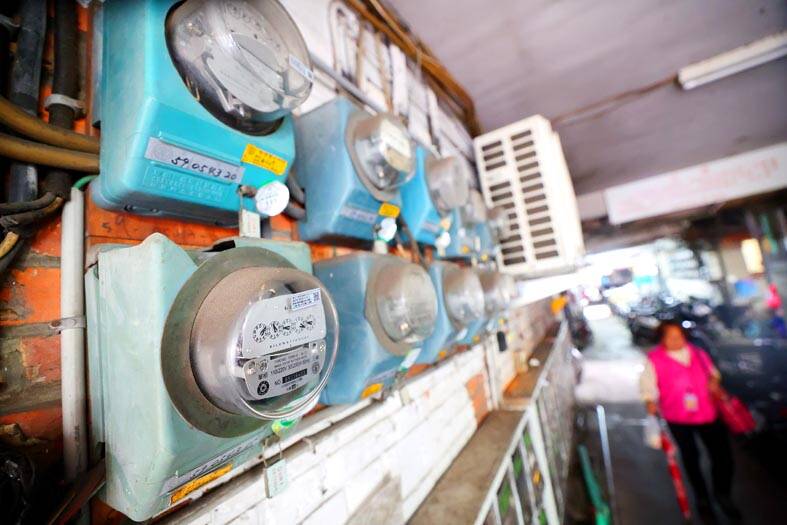Two local trade groups yesterday called for stable power supply to meet a fast pickup in demand from artificial intelligence (AI) devices and applications.
The Third Wednesday Club (三三會) and the Chinese National Association of Industry and Commerce (CNAIC, 工商協進會) raised the issue ahead of an electricity price review committee meeting convened by the Ministry of Economic Affairs tomorrow to discuss electricity rates.
Lin Por-fong (林伯豐), chairman of the Third Wednesday Club whose membership is limited to the top 100 firms in individual sectors, said policymakers should adopt an incremental and fair approach when setting new electricity rates.

Photo: CNA
In the past, the ministry had spared most households and small businesses from rate hikes and made big industrial and commercial facilities bear the brunt, Lin said.
Lin disagreed. “All should share the responsibility of keeping unprofitable Taiwan Power Co (Taipower, 台電) afloat,” he said.
Taipower last year incurred NT$198.5 billion (US$6.22 billion) of losses with cumulated losses soaring to NT$382.6 billion.
Taipower could have eased its losses by raising the share of more affordable nuclear power and policymakers should do so to ensure stable power supply and prices, Lin said.
In addition, the government should extend the services of the Guosheng Nuclear Power Plant in New Taipei City’s Wanli District (萬里) and the Ma-anshan Nuclear Power Plant in Pingtung County’s Hengchun Township (恆春), he said.
Stable and affordable power supply is critical to local technology firms, which are heavy electricity users but play a key role in driving Taiwan’s GDP growth, he added.
CNAIC chairman Thomas Wu (吳東亮) said in a separate venue that the government should seriously evaluate if Taiwan has sufficient energy to meet fast-growing demand from local tech firms involved in the supply of AI chips, servers and other devices.
The nation needs to be prepared since AI applications are expected to mushroom in the coming few years, Wu said.

NEW IDENTITY: Known for its software, India has expanded into hardware, with its semiconductor industry growing from US$38bn in 2023 to US$45bn to US$50bn India on Saturday inaugurated its first semiconductor assembly and test facility, a milestone in the government’s push to reduce dependence on foreign chipmakers and stake a claim in a sector dominated by China. Indian Prime Minister Narendra Modi opened US firm Micron Technology Inc’s semiconductor assembly, test and packaging unit in his home state of Gujarat, hailing the “dawn of a new era” for India’s technology ambitions. “When young Indians look back in the future, they will see this decade as the turning point in our tech future,” Modi told the event, which was broadcast on his YouTube channel. The plant would convert

‘SEISMIC SHIFT’: The researcher forecast there would be about 1.1 billion mobile shipments this year, down from 1.26 billion the prior year and erasing years of gains The global smartphone market is expected to contract 12.9 percent this year due to the unprecedented memorychip shortage, marking “a crisis like no other,” researcher International Data Corp (IDC) said. The new forecast, a dramatic revision down from earlier estimates, gives the latest accounting of the ongoing memory crunch that is affecting every corner of the electronics industry. The demand for advanced memory to power artificial intelligence (AI) tasks has drained global supply until well into next year and jeopardizes the business model of many smartphone makers. IDC forecast about 1.1 billion mobile shipments this year, down from 1.26 billion the prior

People stand in a Pokemon store in Tokyo on Thursday. One of the world highest-grossing franchises is celebrated its 30th anniversary yesterday.

Zimbabwe’s ban on raw lithium exports is forcing Chinese miners to rethink their strategy, speeding up plans to process the metal locally instead of shipping it to China’s vast rechargeable battery industry. The country is Africa’s largest lithium producer and has one of the world’s largest reserves, according to the US Geological Survey (USGS). Zimbabwe already banned the export of lithium ore in 2022 and last year announced it would halt exports of lithium concentrates from January next year. However, on Wednesday it imposed the ban with immediate effect, leaving unclear what the lithium mining sector would do in the